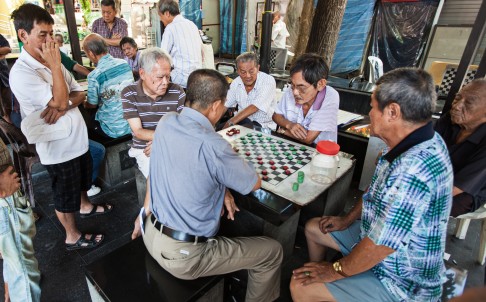Singapore pension contributions may not be enough because of increasing life expectancy, inflation and property costs. Photo: Bloomberg
Hongkongers have long envied Singapore's mandatory pension plan yet many in the city state are finding it increasingly inadequate.
Under the Central Provident Fund (CPF), employees and employers are required to contribute a higher proportion of the salary, but it is still not enough because of increasing life expectancy, inflation and property costs.
Singaporeans under 50 are required to contribute 20 per cent of their salary every month to the fund while their employers must contribute 17 per cent. For those aged 50 to 55 it is 19 per cent and 16 per cent respectively. In the 55 to 60 bracket it is 13 per cent and 12 per cent.
In Hong Kong, employers and employees each pay just 5 per cent of the salary into the Mandatory Provident Fund, with an upper limit of HK$1,500. Both sides can pay more into the fund on a voluntarily basis.
Unlike in Hong Kong, CPF members are allowed to withdraw from their mandatory retirement fund for purposes such as property investment, but once they hit 55, they are required to set aside a minimum sum of S$155,000 (HK$900,000) that they cannot touch until retirement.
After reaching the "draw-down age", employees will get monthly payouts. Because of longer life expectancy, the draw-down age was raised from 63 last year to 64 this year and will be rise to 65 in 2018.
"My research shows that if all CPF savings are not withdrawn during the working life of a contributor, the amount saved should be adequate for the bottom 30 per cent of wage earners. However, for those earning median incomes and above, CPF savings will not be adequate to retire on because of their higher expected expenditures," said Hui Weng Tat, an associate professor of the Lee Kuan Yew School of Public Policy in Singapore.
"There are serious concerns, as evident from the average annualised rate of increase in the real value of CPF savings, falling from 2.6 per cent in the past four decades to 1.1 per cent in the last five years. This is due to higher inflation rates. When withdrawals from CPF for housing are factored in, the inadequacy becomes greater," said Hui.
However, Krishnadas Devadas, chief executive of Singapore consultancy Future Moves Group, said: "The returns on CPF savings should be considered very good."
The yearly interest paid on the CPF range from 3.5 to 5 per cent.
"However, the government has acknowledged that the CPF savings are, for most Singaporeans, insufficient to finance the full length of their retirement," Devadas said.
Since the 1980s, the Singapore government has allowed fund members to use a part of their CPF savings to finance home purchases and health care, and even to make investments.
Singapore retirees said the minimum household income for a comfortable retirement is S$54,000 a year, yet 43 per cent of retirees live on less than S$48,000 a year, according to an HSBC survey of 1,000 Singaporeans.
And, according to the study, 15 per cent of working age people say they will never be able to fully retire.
This article appeared in the South China Morning Post print edition as Singapore fund seen inadequate to retire on

No comments:
Post a Comment